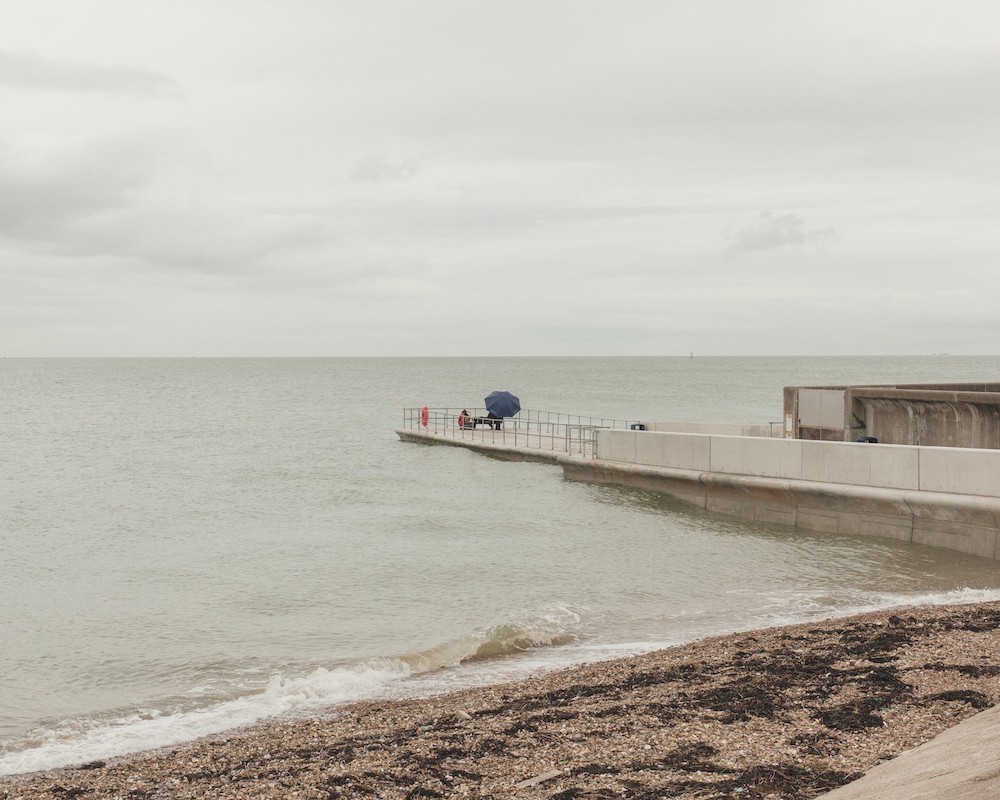Weeknote 17 – 18
- Saw the Anselm Keifer show at White Cube. Nice big paintings with nice expensive textures, not convinced about the quasi-code and equations scrawled over the top of them 1.
- Nam June Paik at Tate Modern though! 2 Fucking yes, more of that.
- Not really in the same league, but the Beautiful Swiss Books exhibition is at Tenderbooks this week. OK so it’s just a dozen or so books sitting on a sculptural brutalist shelf 3, but I try to go every year to keep up with what’s hot. And this year it’s in an actual bookshop, so you can buy the exhibits. Tactical.
- So I charged my iPad for the first time since last summer to do some browser testing, and checked my RSS too.
- Alice, totally disagree. The shoulders on that oversize maternity jumper are incredible. If they restock them in XL I’m getting one for myself. Same with this jacket 4.
- Russell, enjoyed the tune. Thinking about trying a quick dub edit.
- But FUCKING YES the main blogging news.
- If you know you know. But even if you don’t you’ll enjoy this post on norwegian traffic tunnels 5.
- Stephen sent me this important football typography development which I’m very much into. All advertising should just be replaced with terms and conditions imo.
- Apart from posters for cultural events of course. One of the best things about Switzerland is that like 50% of all ad billboards are for art/theatre/music or whatever, and it just makes everything better. These posters by Jiri Mocek 6 reminded me the Czech Republic is pretty similar.
- The UK does have some good public signage I guess 7.
- While I’m linking to things on Instagram, check out this ‘pixelated’ gemstone. I’ve never bought anything with gems in it, so it hadn’t occurred to me how traditional the stone shapes are. Presumably there’s a bunch of interesting stuff you could do with modern tools that no-one could have imagined a couple decades ago.
- Vice do this series Home Coming where writers revisit their childhood home towns. In the latest one Ben Charlie Smoke goes back to the Isle of Sheppy 8.
- I’d never heard of Sheppy before, there’s definitely some subtexts on its Wikipedia page
Aerial view of Eastchurch village, a caravan site, three prisons and the North Sea
Wikipedia caption for a photograph of the Isle of Sheppy
- New season of Hip-hop Evolution on Netflix and I loved every minute. This one covers the period where the internet started turning rap music from a tight disciplined thing into a messy collision of different regional ideas and attitudes smashing off each other in every direction. DJ Screw, bounce, trap, crunk, The Neptunes, Missy and Timbaland, mixtape culture. It all existed in the 90s, but then the internet turned up and starting finding audiences for it. A+ will watch again.
- Velvet Buzzsaw is on Netflix too. Awful. But it did inspire the last sentence in this indiewire review so
Gilroy’s film needed to be 60% better or 20% worse in order to transcend the forgettable silliness of its existence, but it could stand the test of time as a lasting monument to the idea that our own personal taste is the only real thing we ever had.
David Ehrlich for Indiewire
- Which somehow reminded me of the concept of hypermodernity. I’m a bit rusty but wikipedia defines it as “an inversion of modernity in which the function of an object has its reference point in the form of an object rather than function being the reference point for form”.
- Or, that our material reality changes along the lines of what is technically possible rather than following a pre-ordained plan. You figure out what can be done, then you decide which of the options is best.
- Being honest I don’t think the idea of hypermodernity ever really blew up because it fucks the traditional class hierarchies of creativity. Hypermodernity implies that new things are created by the people doing the dirty work, which in turn means all the academics/strategists/philosophers etc aren’t the pioneering creatives they like to imagine, but are simply historians documenting those changes as they occur.
- If postmodernity called bullshit on the idea of a single progress narrative, hypermodernity calls bullshit on the idea of the intellectual. Obviously, having worked in tech and design for a while now, almost every idea or framing I have for how the world works sits completely in the hypermodernist space. Agile? Hypermodern. Iterative design? Hypermodern. Cambridge Analytica? Definitely hypermodern.
- I found this Kotaku review of Red Dead Redemption 2 last summer after finishing the game (and sitting through the end credits). It’s probably my favourite piece of technology writing since Magic Ink.
'I suppose our reputation as a company was that we’re profoundly antisocial, histrionic and looking to be controversial,' Dan Houser told the New York Times in a 2012 interview promoting Grand Theft Auto V. 'And we simply never saw it in that light. We saw ourselves as people who were obsessed by quality, obsessed by game design.' Of course, it is possible to be all of those things at once, and given how antisocial and willfully controversial GTA V wound up being, it was hard at the time to take Houser’s comments at face value. Taken alongside this vastly more earnest, heartfelt new game, those comments assume a slightly different cast.
Intentional or not, Red Dead Redemption 2 can be read as a meditation on failed leaders, and even as a potent critique of the internal and external cultures that Rockstar has helped perpetuate. Dutch Van der Linde is every inch the manipulative boss, frightening not only for his violent nature but for his ability to marshal people to work against their own self-interest. Time and again he reveals his shameless hypocrisy, and his promises of a new life are consistently shown to be empty maneuvering. 'This isn’t a prison camp,' he says at one point, uncannily echoing every supervisor who has ever coerced an underling into a technically optional task. 'I am not forcing anybody to stay. So either we’re in this together, working together to get out together, or we’re not. There simply isn’t a reality in which we do nothing and get everything.' I half-expected him to promise everyone bonuses if they hit their sales target.
The parallels between game development and gang leadership aren’t always so readily apparent, but Red Dead Redemption 2 repeatedly sets its sights on the systematic damage enabled by irresponsible leaders. It does not celebrate Dutch’s actions or his worldview; it repudiates them in no uncertain terms. Dutch is a failure and a disgrace, arguably the game’s truest villain. Thanks to the first Red Dead, we already know that he fails. We even know how he dies — not in a blaze of noble glory, but alone and cold, with no one left to stand by him. Rockstar Games, one of the most successful entertainment purveyors on the planet, will never meet the same fate, but the people who wrote their latest game sure seem aware of the risks of ambition.
Red Dead Redemption 2: The Kotaku Review, by Kirk Hamilton on Kotaku
- I thought about it again last night after Dan posted a long thread about playing the new Zelda.
- At the beginning of 2017 I applied for a Digital Curator role at one of the London Museums. They were open to people working part time, and I thought I could drop one of my (two… three?) GDS roles to free up a few days a week. Didn’t take long in the interview for us all to understand I wasn’t a culture fit (plus it seems part-time roles are for people with childcare commitments, not those who need an alternate revenue stream to live London on a culture-sector salary). But anyway, I bring it up because one of the exhibitions I pitched in the interview was a videogame one. Grand Theft Auto is easily the most significant export the UK has created this century — both financially and culturally — but games are almost totally ignored within the cultural dialogue compared to film, music and books (class stuff again, I assume).
- By coincidence the museum put on a huge videogame exhibition 18 months later, but they totally missed the point by focussing entirely on artisanal indie games. which is like doing an exhibition about the cultural significance of rock music but only showed local bands that never had a hit — rather than focussing on someone like David Bowie who made a genuine impact.
- The other thing they wanted me to do in the interview was suggest a list of ‘digital acquisitions’ the museum could make. Obviously I suggested they acquire logins for the major newspaper website analytics accounts, so we could do something interesting modelling the feedback loops and echo-chambers that shape how a news story grows and evolves as it bounces around the internet.
- Fascinating right? As you can imagine the idea landed like a bag of sick. I guess it might be received better now that the Cambridge Analytica stuff is out in the open a bit more.
- Bought some more clothes this week, did an underwear run to Uniqlo. Pants, socks, heattech etc. Plus I tried this with my macbook keyboard and it seemed to fix it! Happy days!
If you want to chat more about stuff like this, send me an email or get in touch on Twitter.
You can pretend it's 2005 and subscribe to my RSS feed
 This exhibition wasn’t great so we took photos of each other instead
This exhibition wasn’t great so we took photos of each other instead  Nam June Paik at Tate Modern
Nam June Paik at Tate Modern  Some beautiful swiss books on a brutalist shelf
Some beautiful swiss books on a brutalist shelf  I’m thinking about buying some Zara maternity clothing for myself
I’m thinking about buying some Zara maternity clothing for myself  Read BLDGBLOG
Read BLDGBLOG  Poster by Jiri Mocek
Poster by Jiri Mocek  Good sign
Good sign  Sheppy
Sheppy